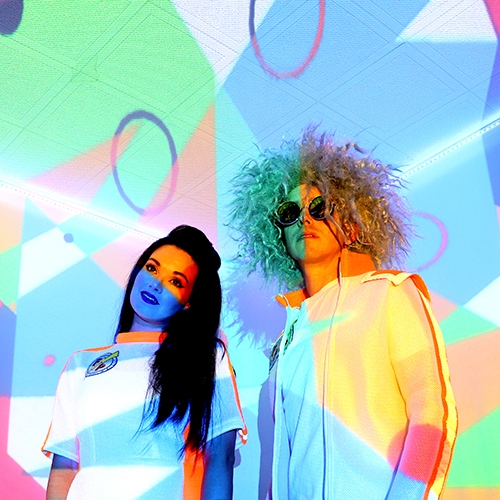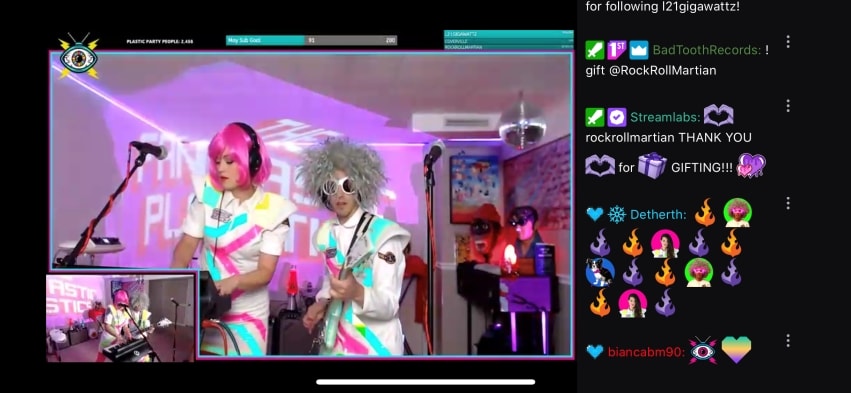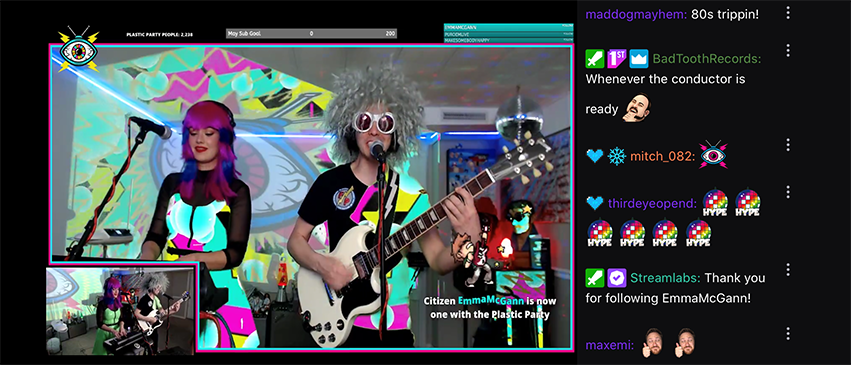As the virtual world grows in significance with the COVID-19 pandemic, performing artists are seeking new ways to connect with their audiences. For many, this has been a struggle—not only to learn the ins and outs of new technologies, but to stand out from the crowd and build a following amidst an endless sea of internet content. But for one Peoria-based band, the future has been here for some time now.
The Fantastic Plastics, self-described as “The Future of The Future,” are a husband-and-wife duo from central Illinois by way of Brooklyn, New York. Consisting of Miranda Plastic on synth/theremin and Tyson Plastic on guitar, the band mixes elements of new wave, synth punk and electro with a retro-futuristic aesthetic encompassing colorful video installations and custom, sci-fi-influenced costumes.
After building their following in Brooklyn, the Plastics spent the summer of 2017 on the Vans Warped Tour—the largest traveling music festival in the nation—before returning to their hometown of Peoria. More recently, the band has built a community around their music on Twitch, a live video-streaming service, where they perform to fans around the world two or three nights a week.
Please introduce yourselves and provide some background on your formative influences. Did you grow up in Peoria?
Miranda: We both grew up in small towns near Peoria.
Tyson: Yeah, Peoria was the big city to us growing up.
Miranda: As a kid I remember listening to KZ-93 and taping songs off the “Hot 8 at 8”—I think that’s what it was called. My parents listened to everything from the Beatles to AC/DC. I guess I had a wide variety of music that influenced me growing up.
Tyson: I remember finding a copy of Magical Mystery Tour and being obsessed with it because of the album cover. But it was probably hearing Nirvana for the first time that influenced me to pick up a guitar and start writing music.
Tell us a little about your previous bands and how you got started in the music scene.
Tyson: A friend of mine took me to One World to see this local band called The Neptunes. This was in the ‘90s, back when the entirety of One World was just that little entryway. The place was packed, and that band really lit the fire for me. Over the years I’ve been in all sorts of bands, and they’ve always had a focus on live performance. The Amazing Kill-O-Watts (formerly HAM) was my first real band. I went on to start other bands and play in other bands, like Analog Saves the Planet and The Red Hot Valentines. I’ve been lucky enough to tour all over the country, from coast to coast with some of these acts.
Miranda: I started in the music scene by making custom garments for various performers in New York City and in Illinois. I also choregraphed and did backup dancing for Analog Saves the Planet. The Fantastic Plastics is my first venture in playing live music.
How did the two of you first meet?
Miranda: When I was a freshman in college I met Tyson through a mutual friend at a “rave” near Bradley University.
Tyson: Neither of us were students at Bradley—it was a very weird experience. Ha! But from that point on, we stayed in touch and worked on musical and artistic projects over the years.
 When did you form The Fantastic Plastics?
When did you form The Fantastic Plastics?
Tyson: I started The Fantastic Plastics with our friend and constant collaborator Dylan (aka Chicken Burger Disco) in 2009, I think. We had worked together previously on some other music projects, and we knew we wanted this one to be “the one.” I was living in Champaign at the time. We wrote and performed together for a little over a year before I moved to New York City. At that point Miranda joined the band on synthesizer, as Dylan stayed behind in Bloomington. But he has continued to write, record and produce videos with us to this day.
Where did the band’s name come from?
Tyson: The name is a vague reference to Andy Warhol, and to the ‘80s in general.
Your name seems tied to your aesthetic, both musically and visually. Who are some of your main influences?
Miranda: It’s funny because people say we look and sound “‘80s,” and in some ways that’s true. But when I design uniforms for the band, I draw inspiration from ‘60s sci-fi and “space race” fashion designers like Pierre Cardin, Paco Rabanne and André Courrèges.
Tyson: As far as our sound is concerned, we’ve always tried to blend elements of the early days of new wave—specifically 1977 to 1981, when synths were a big part of the sound but guitars were still very present: The B-52s, Devo’s first album, Gary Numan and The Cars, to name a few. But there’s elements beyond that too—aspects of Nirvana, The White Stripes and noisy pop like that.
Miranda: I suppose being a child of the ‘80s and ‘90s, those influences are in our DNA.
Tyson: Lyrically, our songs are usually about the pitfalls of overly romanticizing technology, how that has shaped our current society, and what that might look like in the future.
What led you back to Peoria from New York City?
Tyson: We were already considering leaving New York to come back and be closer to family, when we landed a spot on the Vans Warped Tour in 2017.
Miranda: The rent in Brooklyn was so expensive, and we were going to have to basically take the summer off work to be on the road with the tour, so we decided it was the perfect time to move back.
Was it challenging to make that adjustment?
Tyson: It was challenging at first. Living in New York City, you are constantly in fight-or-flight mode and you trust no one, not even your neighbors… especially not your neighbors.
Miranda: I had been living there for over 15 years and was ready for a break. Living in NYC is exhausting on many levels.

Tell us more about your introduction to Twitch. What led you to work in that channel?
Miranda: We had been hearing for a while that we should get on Twitch—that a music scene was growing there and that we were uniquely suited for it. We dragged our feet for over two years before we made the leap. We just didn’t get it. We thought Twitch was just for watching people play video games.
Tyson: It’s much more than that now. There are musicians, inventors, electrical engineers, makers, botanists, scientists, animators… the list goes on and on—all on Twitch, live in real time, creating content, entertaining the masses.
What is so unique about Twitch, and why is it so valuable for your band?
Tyson: Twitch is unique because it’s specifically built for live streaming. It’s completely interactive in a multitude of ways. And what makes it great is that it puts equal value on the viewer and the streamer. This is the future of media. For the last 50 years, television has been a passive experience. Once people start watching and interacting on Twitch, traditional television becomes obsolete. Twitch is all live, in real time, and you as the viewer can choose to be a part of the show if you wish.
Describe a typical live experience on Twitch—your “Plastic Parties.” What kind of preparation is involved?
Miranda: We usually stream for anywhere from three to five hours, two to three nights a week. During a stream we essentially recreate our live show, with our uniforms and projected visuals, but we intermix conversation with our viewers and other interactive content. Our viewers can request songs from our song list made up of originals and our unique spin on covers, mostly from the ‘80s and ‘90s.
Tyson: There is no preparation needed for the viewer; you can just tune in to twitch.tv/FantasticPlastics and watch on your browser. If you want to interact in the chat you need to create a username, which is free. There is no cost involved to watch and interact.
Miranda: People seem to enjoy the conversation as much as they do the live music. It’s live reality TV. You never know what is going to happen or where the conversation will go.
How have you gone about building your audience?
Tyson: The key to building an audience on Twitch is exactly the same as it is in any local music scene. You have to perform/stream consistently. When you aren’t streaming—and this is the most important part—you have to support other streamers, support the scene. We spend as much time, if not more, watching and interacting with other streamers on the platform as we do streaming ourselves.
Miranda: It’s to the point where we might as well cancel our Netflix and Hulu subscriptions. We watch Twitch streamers more than we do anything else.
Has your audience grown since Illinois’ shelter-in-place restrictions went into effect?
Miranda: Our audience growth really took off between Thanksgiving and Christmas when we started streaming more regularly. Good things happen to you on Twitch the more you are on there.
Tyson: Then in March, the “shelter-in-place” orders took effect and our stream has grown exponentially. People are hungry for live music, and right now Twitch is the best place to get it. We are helping to fill a live music void and distract people from all the bad news and misery out there.
Miranda: People tell us that all the time—that they really look forward to our stream as a source of joy.

How does the intimacy of Twitch compare with a traditional live performance? Do you ever miss those shows?
Miranda: Nothing could ever replace the energy of an IRL [“In Real Life”] live show where people are singing along, dancing and crowd-surfing to your music. However, there’s a different energy, a real energy, that you get from the real-time chat that we can see while performing.
Tyson: Yeah, it’s really weird, but the best way I can describe it is like a hallucination. All of the usernames and emotes in the chat become real people, dancing and cheering. It’s really strange, but very palpable.
You recently became Twitch Partners. What does that designation mean for you?
Miranda: There are millions of streamers on Twitch, and only one or two percent ever achieve Partner status. It’s instant credibility when people see that purple checkmark on your account.
Tyson: Partner status gets you fun stuff like a bunch of new custom emote slots, but more than that, it means Twitch is now working with you for opportunities to get sponsorships, front-page views, advertisements and more. It’s the beginning to becoming a professional streamer. Nothing is guaranteed, but the potential is there now.
What lies ahead for The Fantastic Plastics? Are you right at home in this exceedingly virtual world of ours?
Miranda: We have grown very comfortable in this virtual world. We can be far more creative with this medium, and it’s so easy to perform from our home when you compare it to packing up gear to hit the road for weekend gigs where you play for 40 minutes.
Tyson: Maybe this is burnout from years of road gigs influencing me, but the thought of ever touring again seems like a nightmare right now. Haha!
Miranda: But, we are looking forward to some live shows we have lined up in Austin, Texas this month, and the annual Devo convention in Cleveland, Ohio this July. We hope these shows happen—we are truly looking forward to these special events. We’ve had them booked for nearly a year.
Tyson: And non-stop content creation for the foreseeable future.
Anything else you wish to add?
Tyson: Peoria has always been a fantastic hotbed of creativity. There are so many excellent musicians and artists living here, producing amazing work. It is an overly humble scene. I’d love to see a spotlight shown on all of the talent here someday. I’m looking at you, Dave Moe. PM
The Fantastic Plastics can be found on Facebook, Instagram, Twitter, YouTube, Bandcamp, Spotify, TIDAL, Apple Music, and (of course) Twitch.



